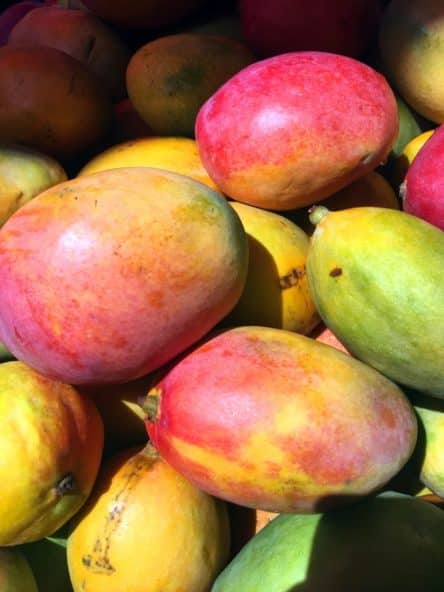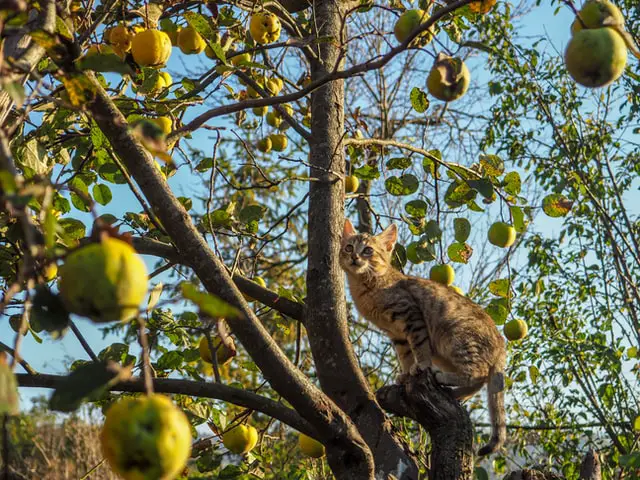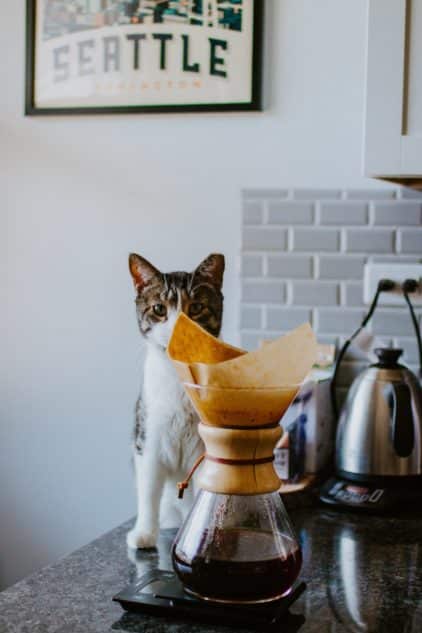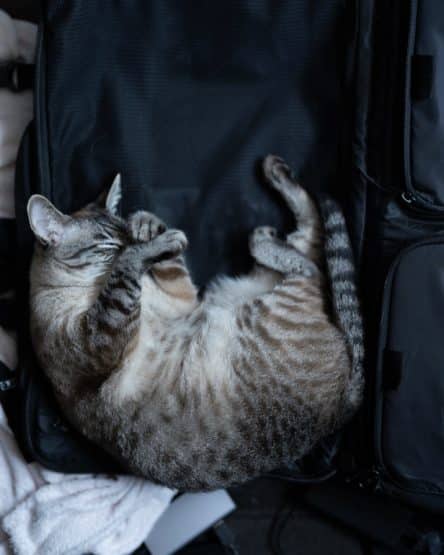Cats are carnivores and adore meat. Their hunting instincts are very powerful and they will go after anything that moves. Fruit and veggies are not exactly your cat’s favorite treat. But can cats eat mango, for instance?
The reason to ask this question is cats being very curious by nature. They can beg for your human food, even if it’s not on their healthy diet list.
In this article, we will be answering the question: ‘Can cats eat mango?’

You will also find out:
- What fruits are safe for cats?
- What fruits are harmful
- If cats can have other foods containing mango
- How to offer your cat mango in a safe manner
- The benefits of offering fruit treats.
Keep on reading to find out: is mango bad for cats?
Mango’s nutritional value
Mango is a superfruit that humans love due to its tropical flavor and high nutritional value. [1]
100 g of mango contains:
- 1.6 g of dietary fiber
- 14 g of sugar
- Calcium
- Iron
- Potassium
- Choline
- B vitamins
- Vitamin A
- Vitamin E
- Copper
In terms of health benefits, this fruit popular in the Indian cuisine has the following positive effects:
- Preventing anemia
The vitamin K in mangoes helps your blood clot effectively and helps prevent anemia.
- Accelerating healing
Vitamin C found in mangoes plays an important role in forming blood vessels and collagen.
- Lowering the risk of cancer
The yellow-orange color of the mango is given by beta-carotene, an antioxidant that fights free radicals. Free radicals are responsible for cell damage and potentially cause cancer.
- Keeping your heart healthy
The magnesium and potassium in mangoes promote lower blood pressure and a regular pulse. A compound called mangiferin is found in this fruit. Studies suggest it can reduce inflammation of the heart.
- Preventing constipation
The dietary fiber in mangoes helps you avoid constipation. The amylase found in this fruit helps with digestion as it breaks down difficult starches.
- Avoiding birth defects
Mangoes contain folate, a substance ensuring healthy cell division and DNA duplication. [2]Women looking to become pregnant should consume foods rich in folate to avoid birth defects.
Do these healthy benefits also apply to your feline friend?
Do cats need fruit?

In theory, one thing is for sure: cats are obligate carnivores, which means their diet should be protein-based. In practice, humans like to share their household food with pets or are begged to do it.
Given the fact that fruits abound in vitamins and minerals, can you feed them to cats?
Yes, you can, although cats don’t need them to stay healthy.
However, if you have to choose between fruit and a high-calorie treat, the fruit is preferable.
So, you can feed your cat fruit, in small amounts, taking cate to avoid fruit that is toxic to felines.
Can kittens eat fruit?

Kittens are so cute that you may be very tempted to share your healthy food with them.
The best is not to do it.
If your kitten has some fruit, it will most likely be fine.
Overdoing it, though, is a bad idea. Vets recommend not introducing anything new to a cat’s diet before 18 months. Also, the kitten should eat premium baby cat food that meets all their nutritional demands.
A tiny piece of fruit can be OK but is not necessary. It may also pose some risks in kittens with a sensitive stomach. The kitten should be weaned to try new or unusual solid foods, in order to avoid choking.
What fruits are safe to eat for cats?

Here is a list of fruits that your cat can have a taste of:
- Bananas
- Blueberries
- Winter squash
- Melon (seedless)
- Pumpkin
- Apples
- Strawberries
Benefits of eating fruit in cats include adding fiber to their diet and offering mental stimulation. The minerals and vitamins in fruit also have a beneficial effect.
However, the cat will be perfectly fine by eating meat only and will not lack any vital nutrient.
What fruits are dangerous for cats?

There are several fruits that are bad for your cat. They can cause digestive upset or even poison them. Here is what you should avoid:
Cherries
The cherry pit contains cyanide, which can be lethal to pets in large quantities.
Citrus
Fruits such as oranges, clementines, lemons, limes, grapefruit, and tangerines are not recommended to pets. A small amount will cause a minor stomach upset, while a larger amount can do more harm. Symptoms of citric acid ingestion in cats include diarrhea, vomiting, irritation, and even central nervous system depression.
Grapes
Keep grapes and raisins away from your pets as they can cause kidney failure. They are harmful even in smaller quantities, as they cause vomiting, diarrhea, and lethargy.
Green tomatoes
While red, ripe tomatoes are allowed, green ones can make pets sick. They contain a toxin called solanine.
The conclusion is to take care of what human foods you give your cat. Some of them are inoffensive for us but toxic to pets.
Can cats eat mango (fresh)?
Cats can eat fresh mangoes as they are not toxic to felines.
Cats can be attracted by the mango’s flavor. The fruit itself is not so interesting for them as cats lack receptors for the sweet taste.
A small amount of mango will do no harm. You can give them a tiny piece every once in a while.
No matter how funny it looks, don’t feed your cat too much mango or other fruits. They are not necessary for their diet and can cause digestive issues.
Can cats eat dried mango?
Dried mango is not exactly the same thing as fresh mango. It is not a good treat for cats for several reasons:
It has a lower nutritional value due to the drying process and it’s harder to digest. This could be a problem for cats with a sensitive stomach.
Dried mango is often added preservatives which are not healthy for pets.
Our advice is to avoid it. Fresh fruit is a safer option for your pet.
What about mango ice cream?
Have you ever eaten ice-cream in front of your cat? Most kitties become curious and want to have a taste of your human treat. Whipped cream is another food that can attract your feline.
The reason behind their craving is not the sugar in the ice cream, but the fat.
Vets warn against feeding your cat ice cream, even if it is just a lick of your bowl. Ice cream contains several ingredients that are bad for cats. Dairy in ice cream is difficult to digest by cats as they are lactose intolerant. Sugar is bad for their health and can cause diabetes when ingested regularly.
Keep such treats to the minimum or better skip them altogether. They are just as bad as store-bought treats that are high in calories.
Benefits of eating mango for cats
Is mango poisonous to cats?
No, it can even provide some benefits. Even if they are not crucial for your cat or can be obtained from other sources.
Reasons to allow your cat to try mango include:
- Vitamin A intake
This vitamin benefits the immune system of both pets and humans.
- Vitamin B supplement
Vitamin B enables the cat’s body to absorb fats and protein found in meat.
- A low-calorie treat
Mango and other fruits are good treats because they contain a small number of calories, promoting a healthy weight.
What if your cat doesn’t like mango?
Your friend swears by their cat devouring mango but yours shows no interest?
Don’t worry; fruit treats are optional. Your cat will be perfectly fine just with quality pet food formulated for felines.
Risks associated with eating (too much) mango
In order to feed your cat mango safely, take into consideration the following:
- Eliminate choking hazard
Avoid giving your cat bits of skin or the seed. They are not accustomed to this type of food and can choke.
- Not overdoing it
You can offer mango or another fruit twice a week. A single cube or a piece the size of a tablespoon is sufficient.
Moderation is required because cats’ digestive systems are not equipped to break down plant-based foods. A large amount of sugar found in mango also represents a problem and can make your cat sick.
- Avoiding seeds
Mango seeds contain a toxin called cyanide. When ingested in high amounts, it can even kill your pet.
- Watching for adverse reactions
Your cat has eaten mango for the first time or it has had a large quantity? It is understandable to be worried. But remember that mango is safe for cats.
For your peace of mind, keep your cat under observation for 24 hours after giving them new food. This way you will observe allergic reactions or digestive upsets immediately and treat them from the first symptoms.
Call the vet if you notice unusual behavior in your cat. Some cats can have unusual reactions to new foods.
Bottom Line
Can cats eat mango? The short answer is yes, cats can eat mango.
You can offer this treat with a few precautions: limiting the quantity, taking the seeds out, and giving it occasionally.